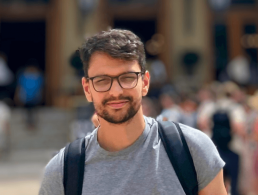Scientist, entrepreneur and author Rana el Kaliouby discusses her journey from Egypt to working on emotion AI at the MIT Media Lab.
Rana el Kaliouby is co-founder and CEO of Affectiva, a Boston-based emotion-recognition tech firm that grew out of MIT’s Media Lab.
Having recently launched her memoir, Girl Decoded, we got the chance to chat to her about how she got to this point in her career and why she believes in a future “where AI and technology can make us more human, not less”.
‘Keeping faith is one of the most important values for a scientist building something that’s never been built before’
– RANA EL KALIOUBY
What first piqued your interest in the idea of humanising technology?
After spending my entire childhood in the Middle East, I had the opportunity to move to the UK to pursue my PhD. As I settled into my new life abroad, I realised I was spending more time with my laptop than I was with any other human being.
There were days when I felt really lonely and homesick, but my laptop was completely oblivious to how I was feeling. All the nuances and all the richness of my feelings were disappearing in cyberspace. Then came the aha moment: what would it take to get our technologies and our devices to understand us in the same way that we understand one another?
So, I started teaching our machines to ‘see’ facial expressions. I’ve been on a mission to humanise technology ever since, pioneering artificial emotional intelligence, or emotion AI, technology.
What experiences led you to where you are today?
When I finished my PhD in the UK, the expectation was that I’d move back to Egypt, find a teaching position and resume life as a ‘normal’ wife and mom. Instead, I got my dream job offer to join my mentor and role model, Prof Rosalind Picard, at the MIT Media Lab to continue my research. Little did I know that meeting Roz would change the entire trajectory of my career and my life. This meant that I’d have to commute from Cairo to Cambridge [Massachusetts] at least once per month, despite the fact that my then-husband and my daughter were back home.
It was an extremely difficult choice to make. I had this conviction that we were onto something with our work and I couldn’t let the opportunity pass me by. So, for four to five years, I regularly made this cross-continental commute, splitting my life on opposite sides of the globe, before eventually moving to the US with my two kids.
During that time, Prof Picard and I were focused on the applications of emotion-recognition technology in a variety of fields, including mental health and autism research. Picard had a huge impact on my life. She taught me about perseverance, never taking no for an answer and keeping faith – one of the most important values for a scientist building something that’s never been built before.
Through my experience with Roz and countless other mentors I’ve gained over the years, I now recognise that being a mentor to other young people – especially young women – is one of the most important roles I can have to give back to the tech and AI communities.
While we were at the MIT Media Lab, Prof Picard and I started to get a lot of commercial interest in our emotion AI technology. We decided to co-found Affectiva, spinning the company out of MIT in 2009. A few years ago, I stepped into the CEO role, and the rest is history!
What were the biggest surprises or challenges you encountered on your career path?
When we co-founded Affectiva, we knew that there were a lot of potential applications of emotion AI, but we underestimated how hard it would be to ‘productise’ the tech for a number of industries all at once. There were a number of years when we made our technology broadly available for other use cases, and that proved challenging. Maintaining focus has helped us have more of an impact on specific industries and use cases, rather than trying to do everything simultaneously.
One thing that surprised us was the applicability and interest in our technology in the automotive industry. We started to see a consistent pattern of interest from automotive companies that wanted to use our technology to monitor driver state – for example, detecting dangerous driving behaviour, like drowsiness and distraction – as well as to understand the state of a vehicle’s occupants.
The level of interest was unexpected, but we knew this was an area where our technology could have a significant impact. So, we decided to focus on that market, and automotive is one of our primary use cases today.
What do you enjoy about your work?
I love painting a vision of the future, showing the possibilities for a future where AI and technology can make us more human, not less. And I love bringing people on board to help make that vision come true. Finally, I love seeing people on our team, and our partners, grow both professionally and personally. For me, that’s been the most rewarding part of my professional journey.
What aspects of your personality do you feel make you suited to your work?
Oftentimes, people tend to think that emotions and business don’t mix. But I lead with my emotions and with empathy, and I think that’s extremely important.
As a leader, I wear my heart on my sleeve and challenge assumptions that we should do things the way they’ve always been done, but that doesn’t mean I can’t be assertive or effective. On the contrary, I’ve found that when I lead with emotions, people are more likely to reciprocate and to channel that bond into their work.
Today marks my 4th anniversary as CEO of @Affectiva ?. It is the biggest challenge I’ve taken on but also the most rewarding, because I get to go on this journey with great people, chart our path together, create, innovate & overcome obstacles.. all the while growing as people. pic.twitter.com/pTHYczoz9H
— Rana el Kaliouby (@kaliouby) May 14, 2020
What role has Affectiva played in your career path?
I often refer to Affectiva as my third kid. To me, my work and my personal story are inseparable – each flows into the other. I look at it as a dual journey – as we, at Affectiva, have pursued our mission to equip machines with emotional intelligence, I’ve become a lot more in tune with my own emotions, making me a better leader and helping me advance my life’s work.
I always say that it takes a village. My mission to humanise technology is no small feat, and it wouldn’t be possible without the amazing team I have at Affectiva. Together, we’re changing how people interact with technology and, by extension, changing the way people connect with one another in a digital world.
What advice would you give to others considering a career in this area?
If you’re interested in a career in STEM or AI, develop strong skills to set yourself apart from other candidates. Beyond comprehending key approaches in machine learning and data science, you should look to areas of innovation in the field. For example, data synthesis is becoming incredibly important in advancing AI algorithms. If you educate yourself in innovative approaches like these, you’ll be a hot commodity in the job market and better prepared in your career.
There are also a lot of concerns regarding ethics in AI. So, it’s crucial to be an advocate for the ethical development and deployment of AI. And don’t just advocate, but also make sure that in all the work you do, you guard for ways that could inadvertently introduce data and algorithmic bias.
Finally, for young women specifically who are hoping to enter the tech field, don’t be afraid to stand up for yourself. Speak up when you have ideas to contribute and don’t let anyone talk over you. Support other women and make them feel comfortable doing the same. We all need to advocate for and support one another if we want to build a strong ecosystem of women in tech.
Want stories like this and more direct to your inbox? Sign up for Tech Trends, Silicon Republic’s weekly digest of need-to-know tech news.




